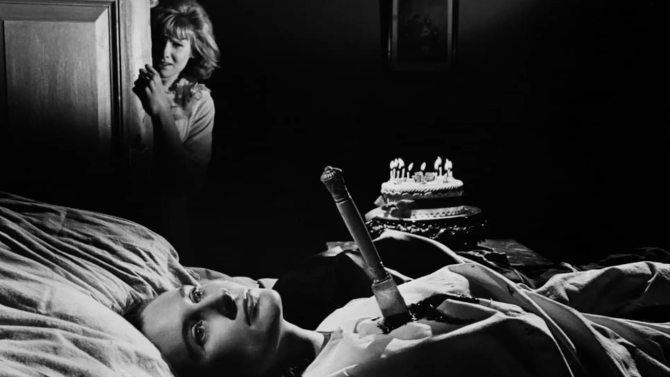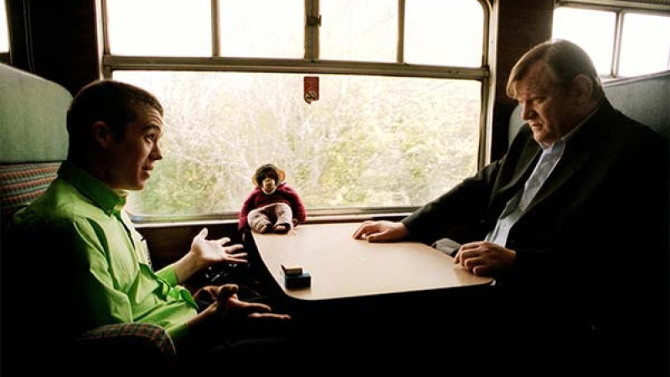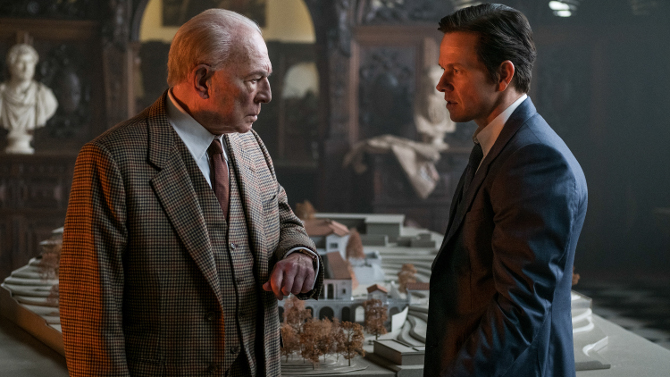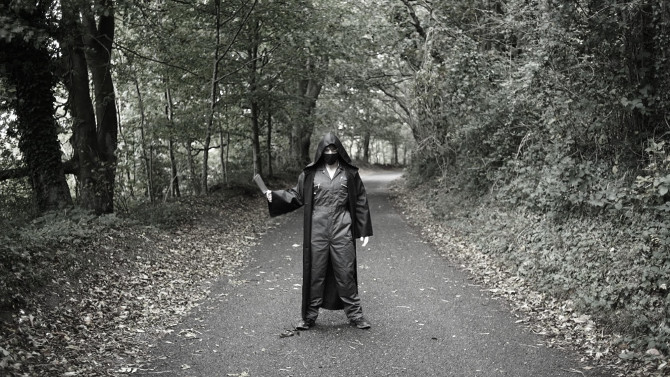
Night Terrors
Unlike most other memorable Hammer horror movies, the 1964 mystery thriller Nightmare, directed by Freddie Francis (perhaps better known as the cinematographer of films like David Lynch’s The Elephant Man and Martin Scorsese’s Cape Fear) eliminates all of the monsters for an old fashioned quasi ghost story... the piece deserving to be remembered up there with those Hammer horror films centered on vampires, resurrected corpses, and lycanthropes. Shot in shadowy black and white, the story follows struggling seventeen year old Janet (Jennie Linden), who is currently away from home living at a finishing school for girls.
-

Train Wreck
Six ShooterJanuary 9, 2018There are many actors and directors that I have long championed, one of which is filmmaker Martin McDonagh. More of a household name today than a few days ago, this past Sunday he took home both Best Screenplay and Best Motion Picture - Drama at the 2018 Golden Globes for his film Three Billboards Outside Ebbing, Missouri (the feature also won for Best Actress - Drama: Frances McDormand, and for Best Supporting Actor: Sam Rockwell). First and foremost a British/Irish playwright, McDonagh made his feature film debut in 2008 with the tragically under-seen In Bruges – a movie that will be reviewed on Filmizon.com in due course. This was followed by a 2012 American/British co-production, Seven Psychopaths, another intriguing film. His third is the award winner from Sunday. . . though many probably do not know that McDonagh won an Academy Award back in 2005 for Six Shooter, earning the golden figurine for Best Short Film, Live Action (his true first effort into the foray of film making).
-

Can’t Buy Me Love
All the Money in the WorldJanuary 2, 2018With a tale that almost sounds like it is right out of the movies, All the Money in the World, Ridley Scott’s 2017 buzzing biopic on the Getty abduction of 1973, was hit hard when star Kevin Spacey got wrapped up in the ever-growing series of sexual assault allegations. . . about one month before the film’s release. In comes Scott’s original choice, acting icon Christopher Plummer, who, with the help of a few returning actors, re-shot the entire role in only four short days – thrusting him into the Best Supporting Actor race at this year’s Golden Globes. . . and likely the Academy Awards. Despite all of the headlines that have pushed people’s attention away from the motion picture itself, it is an engaging piece of cinema. The plot revolves around 16 year old J.P. “Paul” Getty III (Charlie Plummer), the grandson of eccentric billionaire oil baron J. Paul Getty (Christopher Plummer), who is abducted late one night off of the streets of Rome.
-

How to Stave Off Your Midday Hunger
HangryDecember 19, 2017Hangry: bad tempered or irritable as a result of hunger; also the title of the most recent short film from UK Indie writer/director Daniel Harding. Fusing classic horror elements with a modern twist (and adding a few dashes of macabre humour), a posh British couple, Clarey (Sophie Dearlove) and Boyd (Neil James), are taking a trip away from the stresses of their big city life, though, along the way, get lost in the countryside. Both a bit peckish, a surly, ornery attitude begins to seep into their conversation – I am quite sure we have all been there before.
-

Flying the Nest
Lady BirdDecember 10, 2017Indie darling Greta Gerwig makes her solo writing/directorial debut with Lady Bird, a coming of age film that has been building strongly towards the 2017-2018 Awards season. . . earning an almost unheard of rating of 100% on Rotten Tomatoes. Many of the plot points will sound familiar when it comes to a coming of age tale – teen angst, strife between mother and daughter, obsession with sex and losing your virginity, first love, applying for colleges, joining the school theatre club, crushes on teachers and other such things; though, it is not these things that are truly important, but rather the honest, realistic voice in which it is told.
-

Car Wars
Dead End Drive-InOctober 27, 2017Come with me, and you’ll be, in a world of pure Ozploitation. Had you going there, didn’t I?. . . you thought I was going full Willy Wonka, but rather, I am transporting you to a very different landscape, that of the Australian exploitation film. Growing out of the R rating after it was instituted (as well as helped by new tax cuts), this Australian New Wave rose out of the 1970s and 80s (a little later than its American counterpart), and is a broad term that refers to no specific genre, encompassing horror, comedy, sexploitation, post-apocalyptic, dystopic and so much more – though it does slant the traditional norms of culture at the time. It is hard to argue that the Mad Max franchise, directed by George Miller, would not be the best known example of this type of movie.
-

In a Flash
PolaroidOctober 20, 2017Imagine being wakened by a bright light, not like that of some sort of alien abduction, but rather as if someone was snapping your photo, with the flash on, in the pitch black of your own bedroom. . . well, that is the concept of the 2015 short film Polaroid. Produced, directed, filmed and edited by Alex “Pressplay” Wohleber, it is a vignette of sheer terror. Waking from the bright light and distinct sound of a Polaroid picture being taken, our lead, simply known as Guy (Matt Halpern – also a producer), not only finds himself in a possible robbery situation, but also quickly learns that the electricity in his home isn’t working.
